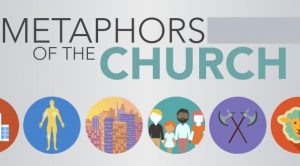 Good evening. Welcome back to our continued study in God’s Word and our examination of the Metaphors of the Church. Last week we spent our time together looking at the metaphor of the Church as Christ’s Body and Jesus as its Head. We looked at our interdependence and the fact that we all have a necessary role to play in building the kingdom of God. We looked at our diversity and saw that we are uniquely gifted and placed in the Body just as God has directed…to serve one another and enlarge and enhance His Church. And we looked at the unity into which God has placed us…all baptized by one Spirit into One Body, with no distinctions by race or gender or status. Our identity is found in our relationship with Jesus, not in human and worldly distinctions or factions. Our identity as citizens of the kingdom of God and joint heirs with Christ effectively erases those distinctions.
Good evening. Welcome back to our continued study in God’s Word and our examination of the Metaphors of the Church. Last week we spent our time together looking at the metaphor of the Church as Christ’s Body and Jesus as its Head. We looked at our interdependence and the fact that we all have a necessary role to play in building the kingdom of God. We looked at our diversity and saw that we are uniquely gifted and placed in the Body just as God has directed…to serve one another and enlarge and enhance His Church. And we looked at the unity into which God has placed us…all baptized by one Spirit into One Body, with no distinctions by race or gender or status. Our identity is found in our relationship with Jesus, not in human and worldly distinctions or factions. Our identity as citizens of the kingdom of God and joint heirs with Christ effectively erases those distinctions.
Over the next few weeks, we are going to be looking at another metaphor of the Church; that of sheep and shepherd. While the metaphor of the Body is readily understood as we all have an intimate acquaintance with the nature of a body…after all we carry one around with us…the relationship between sheep and shepherd is not nearly as familiar to most of us. But we can gain a degree of understanding and familiarity by looking at a couple of passages of scripture that reflect upon it. I would like to open our study this evening with the most famous expression of this metaphor…the 23rd Psalm. Here, we read,
 “1 The LORD is my shepherd, I shall not want. 2 He makes me lie down in green pastures; He leads me beside quiet waters. 3 He restores my soul; He guides me in the paths of righteousness for His name’s sake. 4 Even though I walk through the valley of the shadow of death, I fear no evil, for You are with me; Your rod and Your staff, they comfort me. 5 You prepare a table before me in the presence of my enemies; You have anointed my head with oil; My cup overflows. 6 Surely goodness and loving kindness will follow me all the days of my life, And I will dwell in the house of the LORD forever.”
“1 The LORD is my shepherd, I shall not want. 2 He makes me lie down in green pastures; He leads me beside quiet waters. 3 He restores my soul; He guides me in the paths of righteousness for His name’s sake. 4 Even though I walk through the valley of the shadow of death, I fear no evil, for You are with me; Your rod and Your staff, they comfort me. 5 You prepare a table before me in the presence of my enemies; You have anointed my head with oil; My cup overflows. 6 Surely goodness and loving kindness will follow me all the days of my life, And I will dwell in the house of the LORD forever.”
It is interesting…This psalm has much to say about the shepherd but little to say about the sheep… and that is, I suppose, to be expected. The psalm focuses on the care of the shepherd for his sheep. But to truly appreciate the care described in this psalm, we must stop for a moment and look at the nature of sheep. It is not accidental that we are characterized as sheep in the pages of scripture. We have much in common with sheep, and we find this characterization often in the Word… where we find dozens of references to God’s people as “sheep”.
So, what are some of the characteristics of sheep? Sheep are easily frightened and timid. They tend to wander and go astray…they get easily lost. They are utterly unable to care for themselves…left to their own devices, they will drink foul water and overgraze to the point of destroying the pasture. They have little defensive ability and are easy prey for the predators around them. They tend to fight for dominance among themselves, establishing “pecking orders” where some sheep are at the mercy of those who are stronger or more aggressive. Yet they also follow a “mob mentality”, doing whatever the other sheep are doing. Often, in seeking comfortable places to lie down and be at ease, they can find themselves unable to regain their feet. Left unattended in this position, they will die. Does this sound like any similar group with which we have experience? These same things, of course, characterize people. Easily frightened…fighting for dominance…following the crowd…do we have to look any farther than this moment in history to find these traits displayed in abundance? In the same way that sheep are in need of a shepherd to give them guidance and protection, so, too, are we in need of a shepherd…and our shepherd is the Lord. Let us return to the Psalm 23 to learn more about our Shepherd…
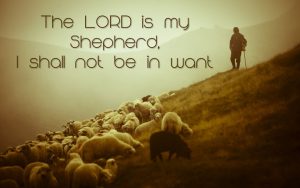 The first thing that David says about the Shepherd is that, under His care, we “shall not want”. While we might find ourselves in difficult circumstances, we are always under His watchful eye. We will not suffer from a lack of those things that God has determined are beneficial and needful for us. It does not speak only of material provision, it goes beyond that. We will not want for the Shepherd’s loving care and labor. We will not want for His ongoing attention and concern. We will not want for His presence and protection. This is a statement of the overall theme of the 23rd Psalm…the remainder of the psalm goes on to further detail and describe His care for us, His sheep.
The first thing that David says about the Shepherd is that, under His care, we “shall not want”. While we might find ourselves in difficult circumstances, we are always under His watchful eye. We will not suffer from a lack of those things that God has determined are beneficial and needful for us. It does not speak only of material provision, it goes beyond that. We will not want for the Shepherd’s loving care and labor. We will not want for His ongoing attention and concern. We will not want for His presence and protection. This is a statement of the overall theme of the 23rd Psalm…the remainder of the psalm goes on to further detail and describe His care for us, His sheep.
In the next verse, David says, “He makes me lay down in green pastures.” There is an excellent book by Phillip Keller entitled “A Shepherd Looks at Psalm 23” that gives great insight into this psalm. I would highly recommend it for those interested in deepening their understanding of the 23rd psalm.
Keller, in discussing this verse, says, “The strange thing about sheep is that because of their very make-up it is almost impossible for them to be made to lie down unless four requirements are met. Owing to their timidity, they refuse to lie down unless they are free of all fear. Because of their social behavior within a flock, sheep will not lie down unless they are free from friction with others of their kind. If tormented by flies or parasites, sheep will not lie down. Only when free of these pests can they relax. Lastly, sheep will not lie down as long as they feel in need of finding food.”
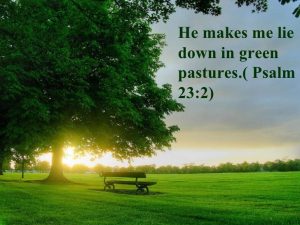 So, the picture here is of a flock that has confidence in the care of their shepherd. He brings them to green pastures and so alleviates their fear of growing hungry. He exercises discipline among the sheep to keep one sheep from “bullying” another. He keeps them in good health and free from parasitic infestation…those sources of constant irritation and infection. He stands among them, protecting them from those who would come to harm the sheep. And through the exercise of this care, his presence serves to comfort and calm the sheep, allowing them to be at peace.
So, the picture here is of a flock that has confidence in the care of their shepherd. He brings them to green pastures and so alleviates their fear of growing hungry. He exercises discipline among the sheep to keep one sheep from “bullying” another. He keeps them in good health and free from parasitic infestation…those sources of constant irritation and infection. He stands among them, protecting them from those who would come to harm the sheep. And through the exercise of this care, his presence serves to comfort and calm the sheep, allowing them to be at peace.
Beloved, is this not a wonderful illustration of Jesus’ loving care for us as well? The problem with sheep is that they often seek their own ways instead of keeping themselves under the provision and care of the shepherd. We find that it is our problem as well. Just as the shepherd has to intercede on behalf of the sheep…disciplining them, guiding them, protecting them…so, too, does Jesus do for us. How often are we reminded in the Word to consider others above ourselves and not think of ourselves more highly than we ought? How often are we reminded to put off the old man and put on the new…to put aside the sin that so easily besets us… those things that are parasitic and lead to declining spiritual and physical health? How often are we told to seek refuge and peace in the arms of our Lord? Satan tells us that we are somehow missing out if we set aside the desires of sin and self. The imagery of this psalm…this metaphor…clearly shows us otherwise. The very things that Satan would have us pursue and strive after are the very things that steal our peace and weaken our souls.
 The next acts of care by our shepherd are that “He leads us beside quiet waters. He restores our souls” The first speaks to his providing a critical necessity of life…water. And these water sources are “quiet”…are “still”. They are not turbulent and dangerous, where drinking would be precarious for the sheep. The primary source of these “quiet waters” described would actually be the droplets of dew covering the pasture each morning. But the shepherd would have to be diligent to rise early and lead the sheep into the pasture before the morning sun would cause the dew to evaporate. In addition, the shepherd would lead them to calm streams or springs where they could drink their fill in safety. If the shepherd was lazy or uncaring, the sheep would find themselves suffering from thirst in the heat of the day and in danger of weakness and death. But the good shepherd…the one who loves and is committed to his sheep…provides for his sheep and keeps then safe and satisfied. This is the character and heart of our “Great Shepherd”
The next acts of care by our shepherd are that “He leads us beside quiet waters. He restores our souls” The first speaks to his providing a critical necessity of life…water. And these water sources are “quiet”…are “still”. They are not turbulent and dangerous, where drinking would be precarious for the sheep. The primary source of these “quiet waters” described would actually be the droplets of dew covering the pasture each morning. But the shepherd would have to be diligent to rise early and lead the sheep into the pasture before the morning sun would cause the dew to evaporate. In addition, the shepherd would lead them to calm streams or springs where they could drink their fill in safety. If the shepherd was lazy or uncaring, the sheep would find themselves suffering from thirst in the heat of the day and in danger of weakness and death. But the good shepherd…the one who loves and is committed to his sheep…provides for his sheep and keeps then safe and satisfied. This is the character and heart of our “Great Shepherd”
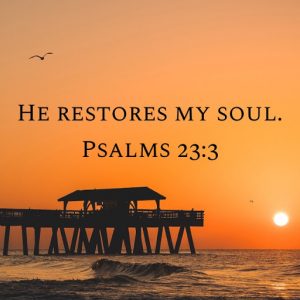 The second act… “He restores my soul”…references the duty and desire of the shepherd to ensure that none of the sheep had become “cast down”…in a place where they could not right themselves. As mentioned earlier, sheep would lie down and sometimes find themselves unable to regain their feet. A sheep in this predicament would likely die without the help of the shepherd. In the same way a sheep can be “cast down” and be unable to get up, so too can our souls be cast down and despairing, unable to find a way back to fellowship with God. Just a few weeks ago, we looked at a poignant example of this when we saw David’s sin with Bathsheba. He was a man floundering under the consequences of his sin. He was in despair and weary…so heartsick that he felt pain in his very bones. And what was his prayer in Ps 51? “Create in me a clean heart, O God, and renew a right spirit within me…Restore to me the joy of your salvation, and sustain me with a willing spirit.” David, in that time after his grievous sin, was a “cast sheep” unable to find his spiritual footing…and the Good Shepherd graciously restored his soul. Beloved, we have the same shepherd…one who is always on the lookout to restore us in times of great spiritual peril as well.
The second act… “He restores my soul”…references the duty and desire of the shepherd to ensure that none of the sheep had become “cast down”…in a place where they could not right themselves. As mentioned earlier, sheep would lie down and sometimes find themselves unable to regain their feet. A sheep in this predicament would likely die without the help of the shepherd. In the same way a sheep can be “cast down” and be unable to get up, so too can our souls be cast down and despairing, unable to find a way back to fellowship with God. Just a few weeks ago, we looked at a poignant example of this when we saw David’s sin with Bathsheba. He was a man floundering under the consequences of his sin. He was in despair and weary…so heartsick that he felt pain in his very bones. And what was his prayer in Ps 51? “Create in me a clean heart, O God, and renew a right spirit within me…Restore to me the joy of your salvation, and sustain me with a willing spirit.” David, in that time after his grievous sin, was a “cast sheep” unable to find his spiritual footing…and the Good Shepherd graciously restored his soul. Beloved, we have the same shepherd…one who is always on the lookout to restore us in times of great spiritual peril as well.
So, what else can we learn about our Shepherd from this magnificent psalm? The next thing mentioned is that “He guides us in the paths of righteousness for His name’s sake.” The imagery here is readily understood by anyone familiar with keeping sheep. Because of their habitual behavior and tendency to follow the leader, sheep will tend to travel the same pathways to the same pasture until the paths become rutted and foul and the pastures become depleted and barren. It takes a wise and prepared shepherd to lead them along fresh paths to fresh pastures. Sheep must constantly be guided away from the places and paths they would habitually use, and led along new paths to where they would find sustenance and safety. In the same way, the Good Shepherd leads us along paths as well, but they are “paths of righteousness”, for our calling is to “be holy, for I (God) am holy”. Beloved, we have talked about this at great length in previous studies. We are called to be conformed to the image of Jesus Christ. In this psalm, we see that the Good Shepherd leads us along the paths that will bring this to pass… paths that lead us to personal righteousness and holiness. They are pathways defined and discussed in many other passages of scripture… pathways of ”examining ourselves”…of ”praying without ceasing”… of ”letting the Word of Christ dwell within us richly”… of “being anxious for nothing, but in everything by prayer and supplication with thanksgiving letting our requests be made known to God.”…of ”loving God with all our heart, soul, mind, and strength; and our neighbor as ourselves”…of ”pressing on toward the goal for the prize of the upward call of God in Christ Jesus”. These are but a few of the “paths of righteousness” along which the Good Shepherd would guide us and accompany us.
 And take note that the verse goes on to say, “for His names sake” Not only do these “paths of righteousness” lead to our becoming holy and Christ-like… in that “becoming”, our Lord is honored and glorified. We have the ability to either bring honor or dishonor to Jesus’ name depending upon the pathways on which we choose to walk…We have the inconceivable opportunity, through our behavior and action, to influence the way the world around us sees our Lord, the Good Shepherd, the very God of heaven and earth.
And take note that the verse goes on to say, “for His names sake” Not only do these “paths of righteousness” lead to our becoming holy and Christ-like… in that “becoming”, our Lord is honored and glorified. We have the ability to either bring honor or dishonor to Jesus’ name depending upon the pathways on which we choose to walk…We have the inconceivable opportunity, through our behavior and action, to influence the way the world around us sees our Lord, the Good Shepherd, the very God of heaven and earth.
Well, we seem to be coming to the end of our time together this evening, and there is no way to finish our study of Psalm 23 in the time remaining, so we will plan on finishing our study of Psalm 23 next week, and then on to John 10 the following week, where we will hopefully gain even more insight into our relationship with Jesus, the “Good Shepherd. Until then, let us have thankful hearts for His grace and care for us, the sheep of His pasture. And let us remember and pray for those who have yet to experience the joy of life under His care.
Let us pray.
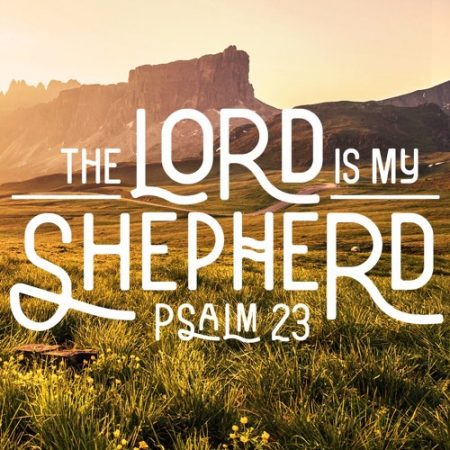

0 Comments